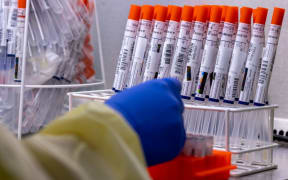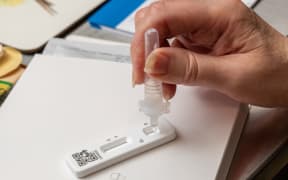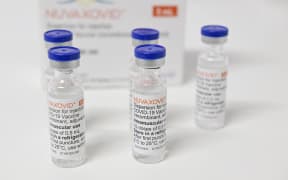Director-General of Health Ashley Bloomfield says the health system relies on New Zealanders' continued cooperation as almost 20,000 cases are announced today.
Watch a replay of the briefing here:
Dr Bloomfield is resuming his appearance at daily 1pm media briefings amid the Omicron outbreak, with peak cases and hospitalisations expected in the next few weeks.
He says today nearly 20,000 new cases of Covid-19 are being reported, with 373 people in hospital, nine of whom are in ICU.
He says it is hard to estimate how many people in hospital with Covid-19 are there because of the virus, as opposed to simply having the virus and being there for a different reason.
However, he says Middlemore Hospital's estimate of about 70 percent to 80 percent presenting because of Covid-19 symptoms gives a good gauge.
There are just under 100,000 active cases across the motu, he says.
"I know that such a high daily case number can be concerning for people to hear, and many of us will now have whānau members who now have Covid-19, but it's important to remember that Covid-19 now is a very different foe to what it was at the beginning of the pandemic."
He says what has helped New Zealand so far has been doing the basics well and we should keep doing this - wearing masks, practising good hand hygiene, and avoiding going out if unwell.
"There's no doubt the next few weeks are going to be tough, the health system can't do it alone, so thanks in advance to all New Zealanders for continuing to support our efforts to live with the virus on our terms."
He says the high vaccination rate means for most people Omicron will be a milder illness and can be managed safely at home.
Dr Bloomfield says PCR testing has served us incredibly well, but with thousands of cases each day we did reach the point last week where rapid antigen testing became both useful and appropriate.
He says samples were typically pooled earlier on in the outbreak, but a positive test in a batch means each will need to be retested. Higher test positivity rates now however mean it becomes less feasible.
He says prior to 7 February, none of the labs had ever exceeded 5 percent test positivity, but the swift increase in positive cases has affected that. Labs have also had other difficulties including vacancies in roles and sickness because some lab workers have contracted the virus.
Apology over test result backlog
Bloomfield says he wants to apologise to people whose tests have been delayed, but says they have committed to completing the test processing.
People are still advised to seek a test, though some people facing a longer delay should also seek a rapid antigen test, he says.
The samples affected by the backlog may be slightly less accurate - they are more likely to show a negative result - but all positive results will be accurate.
Bloomfield says some 9000 tests were sent to Queensland for testing, to help clear the backlog. He says the backlog is clearing, but anyone who had a test on 23 February or earlier, or who has developed symptoms, should collect a rapid antigen test from their local testing centre or seek advice from Healthline.
He says the problem with delays in PCR testing was less to do with delays in rolling out rapid antigen tests, and more to do with the ministry being "a day or two late" to recognise how quickly the virus was spreading.
"Once the samples were in the lab it's hard to take them out and redistribute them, so we still had capacity across the network but we didn't have the opportunity to redistribute them and probably if we'd started to do that a day or two earlier, then we may still have had a backlog but perhaps not such a big one."
Bloomfield says test processing has got to a much more manageable level in the past 24 to 48 hours.
He says there is strong uptake of RATs for people who have symptoms, or who are household or close contacts, as well as surveillance testing at hospitals and aged care facilities.
If people need to pick up a rapid antigen test, the Healthpoint website has an increasing list of places which have them available.
Dr Bloomfield says there are good numbers of the tests available now - over five million have been distributed in the last seven days, there are over 12m in storage, and over 16m are expected to arrive this week.
Self-reporting of test results
Bloomfield thanks the more than 40,000 people who have self-reported a rapid antigen test result. He says it is an important measure to give officials a good idea of how far the virus is spreading.
He says people who are unwell will be given enough tests for three tests per eligible person in their household. People who are critical workers can also preorder the tests online from testing centres.
The average length of people with Covid-19 who are going into hospital is about two or three days, Bloomfield says, about half the length of time as was seen during the Delta outbreak.
Hospitals are at about 80 percent occupancy at the moment, which is lower than it has been. Intensive care units are at about 57 percent occupancy, so there is still capacity.
He says it's been great to see good uptake of self-service tools, with about 54 percent of people who have been notified as being a case through a text in the past week having followed up with the case investigation form online.
About 90,000 people are being managed through the clinical care database.
During question time Bloomfield says there is a bit of a lag on whole genome sequencing for those who have been in hospital, and with the short hospital stay times, there is not an accurate picture of how many cases in hospital are Omicron versus Delta.
The most common symptoms are cough, sore and scratchy throat, a runny nose, and generally feeling unwell, "that sort of flu-ey feeling, the whole body aches", but people who are not boosted are far more likely to have more severe symptoms.
He says the loss of sense of smell and taste does not appear to be as much of a notable symptom for Omicron, but some young people have also been experiencing an upset stomach.
Bloomfield says unpooled capacity at the moment for PCR tests is about 30,000. The 70,000-test per day figure given earlier for surge capacity testing was using pooled testing, which is no longer viable, he says.
Impact on hospitals
He says deferral and delays to planned care elective surgery - the first thing that gets affected by high case numbers - is being seen particularly in the Auckland region. People avoiding spreading the virus will be important for reducing the impact on that in other regions as well.
Middlemore was reporting about 15 to 20 percent of staff were not at work today because staff were themselves cases or household contacts, or looking after others.
However, this is something the hospital experiences every winter, and DHBs have plans in place to manage it, he says.
He says once Omicron has peaked, there are a few concerns which are being looked at. One is changes in the traffic light, another is whether boosters should count as being fully up to date in the vaccine pass, and the third is the role of vaccine passes and mandates.
As the prime minister has signalled, these will all be up for debate once the peak has passed, and the government has been seeking advice on that.
He says he knows there have been long queues for rapid antigen tests in Wellington and some shortages with the tests at GPs, and he has directed staff to work with district health boards every day to ensure the tests are distributed where they are needed.
DHBs are very good at surging staff where they are needed and he is confident they will respond as required.
Dr Bloomfield says people at the protest at Parliament calling on people to stop scanning, wearing masks and complying with the settings is irresponsible, and doing those things is still useful.
He says after the decision today to approve the Novavax vaccine, deliveries are expected to arrive in the country in the next couple of weeks, by mid-March.
It is approved for a primary course - not yet available for boosters - but that is expected to come some time down the track.
"It's a good vaccine, it's an effective vaccine and it's a relatively safe vaccine."
He says there is good evidence that Pfizer's mRNA-based vaccine has a very good safety profile, and it is incredibly effective, so the advice is - and ministers have agreed - that the majority of the vaccination programme will continue to be Pfizer based.
Referring to the high number of cases within some university halls of residence, Bloomfield says there is a nationwide superspreader event going on - the start of the university year.
However, he says universities have done very good planning for it and are supporting their students, and he is very encouraged by what we're now seeing.
Bloomfield says he has a family member in a hall of residence, and it's clear to him that the halls have made good preparations for students' return, and are dealing with the situation well.
Dr Bloomfield believes the Ministry of Health is getting a good picture of the overall burden of cases and their spread across the country. However, the Ministry intends supplementing its testing with modelling and wastewater results.
"We could only be finding a third or a half of these cases, we simply don't know, but I think if you look at the rapid rise and the fact that we are capturing, you know, 20,000 cases in a day here in New Zealand and we've got 100,000 people we know are active cases, and from probably your own understanding of what's happening in communities that you are a part of, I think we're getting a pretty good picture of what the burden of infection is."
The past two days have seen daily cases above the 14,000 mark, and hospitalisations have also continued to increase, reaching 344 yesterday.
It comes as the government yesterday confirmed New Zealanders would be able to return to New Zealand without isolating, with the date for returnees from countries other than Australia brought forward to Friday.
New Zealanders in Australia and critical workers were yesterday able to return without entering managed isolation.
People who are eligible but have not yet got their booster shot are urged to, as it protects against both transmission and severe illness from the Omicron variant.






